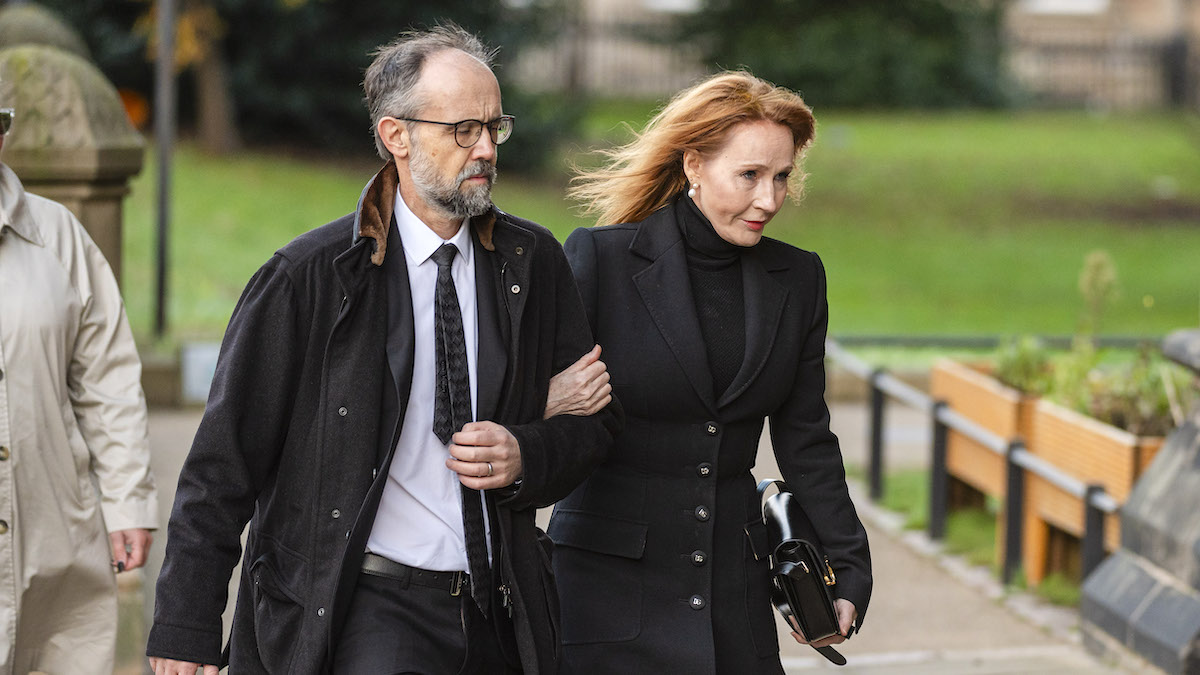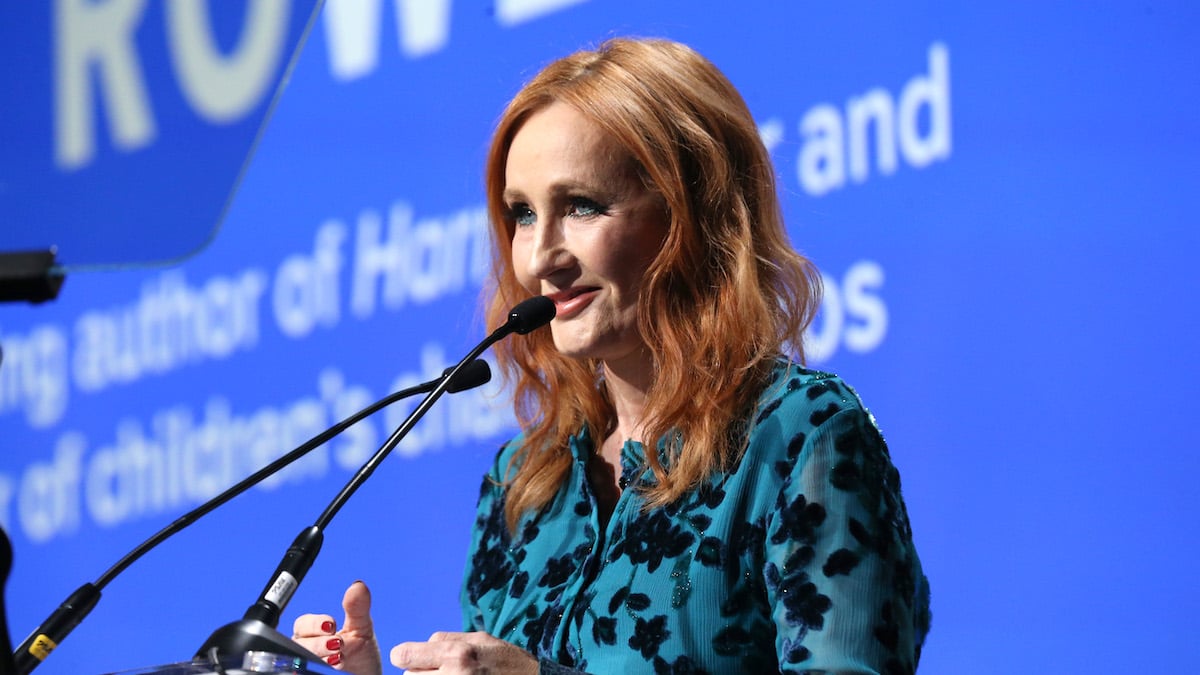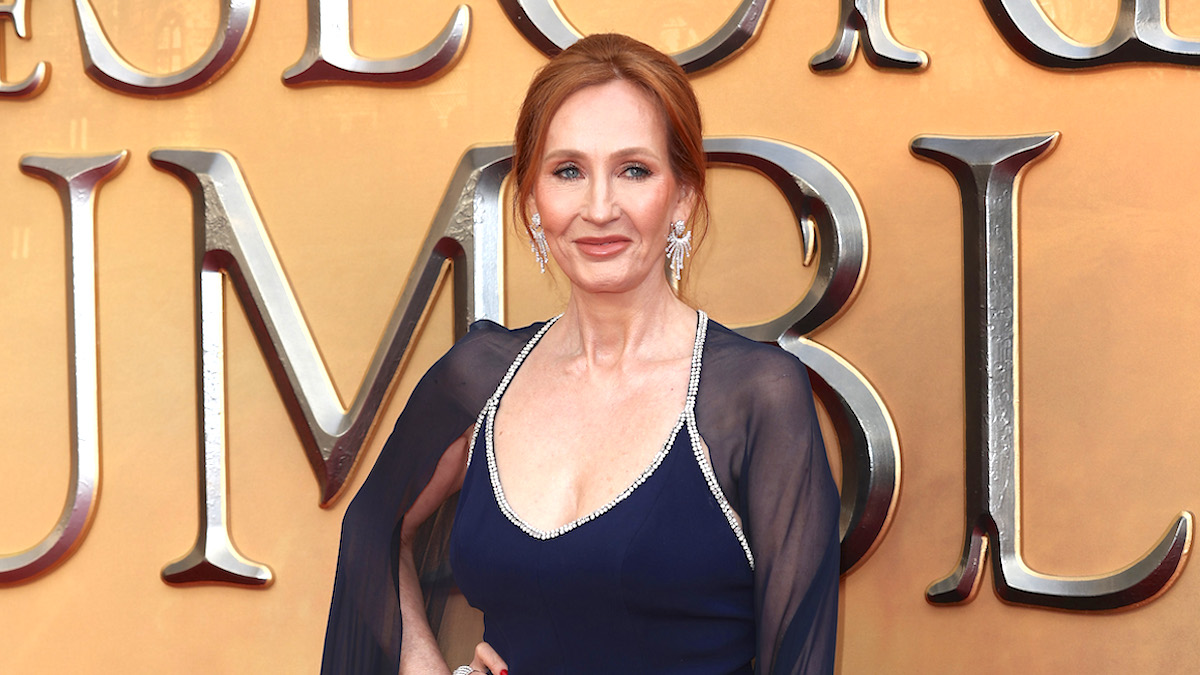Warning: The following article contains sensitive subject matter, including mentions of rape and suicide. Please proceed with caution.
I’m not even going to give a preamble here; let’s just jump right in with J.K. Rowling‘s tweet below.
If you’re not in the mood to parse all of what Rowling has to say here, the main takeaways are as follows: she believes a woman is a human who produces large gametes (which is effectively a granular way of saying that a woman is someone who’s born as a woman, intersex bodies notwithstanding) and that because they have bodies that produce large gametes, they’re subject to extremely particular life experiences and oppression. She also claims to sympathize with those of us living with gender dysphoria, hoping that we live safe lives, while also making clear that she does not believe hormone therapy and surgeries can turn people into the opposite sex, nor does she believe in an esoteric concept of gender that goes beyond the body. Lastly, she’s not fond of trans people existing in such gendered spaces as sports teams, prisons, and bathrooms.
Let’s break this down. First and foremost, I’m well aware that people who were born female have generally had a vastly different life experience than that of mine and other trans people; to suggest otherwise would be insincere. It would be just as insincere, however, to suggest that trans people aren’t subject to their own experiences and oppression, both in our personal and societal lives, entirely because of our transness. That does not invalidate the experiences faced by biological women any more than the experiences of biological women invalidate those of trans women. Both of these experiences are, of course, unique, and they should be addressed by those who have had the corresponding experiences to ensure that we can all gain a better understanding of one another and subsequently accommodate the most paramount needs for the corresponding demographics in our societies.
More importantly, none of these experiences can possibly intrude on one another in any meaningful way; calling tampons an item for “people who menstruate” does not invalidate the experience of a biological woman (and if she feels that it does, then she has a lot of insecurity to work through), but rather acknowledges the experience of trans men along with it. There is no limit to how many of these experiences we can recognize in our day-to-day lives, nor is there any true need to compartmentalize them any more than they need to be. And considering how far removed the trans experience is from the public consciousness, it’s something that we have a responsibility to bring to the forefront whenever we can.

Even within the macro experience of a biological woman, or the macro experience of a trans woman, there remains an abundance of differences between each individual experience. These differences, which manifest in incalculable ways and rates, create a world where it’s almost flippant to suggest that a definitive experience exists for men, women, trans men, trans women, and just about every demographic on this Earth that we all happen to be sharing. There are patterns of oppression and struggles, absolutely, but addressing each of those is a matter of literally addressing those issues, regardless of how involved the word “woman” is in any of them.
In saying that, we’ve reached the crux of Rowling’s failings: whether she’s hateful or virulent or anything of the sort is a ball we can hit back and forth forever, but what can be said almost irrefutably is that she’s not thinking big enough here, and that’s completely unhelpful at best. I think back to her sentiments on the Isla Bryson case last year, in which Bryson, a supposed trans woman, was placed in a women’s prison despite Bryson’s history of sexual violence. Rowling was upset, as she and anyone else would be over such a verbose mishandling of the justice system and the safety of other prisoners.
My question, however, is if Rowling would be just as upset if someone like me, a trans woman who by way of surgery has a vulva, were to be sent to a men’s prison, where the resulting sexual violence would be all but guaranteed. I’m not suggesting what her feelings would be one way or the other, but it does seem to me that she’s focused on the possibility of trans women prisoners raping other people in prison more than the fact that our prison systems are entirely conducive to a culture of pervasive sexual violence. Obviously that’s not an issue that can easily be solved, but remedying the latter would almost certainly do the same to the former, which is far more likely to be met with a nuclear solution, and subsequently create about as many would-be atrocities as it seeks to prevent.
Moreover, while Rowling claims to be sympathetic towards those of us who suffer from gender dysphoria, I’ve not once seen a case of her support for education on the matter, accessibility for the hormone therapy that aims to alleviate said dysphoria, or anything whatsoever that would make the world a bit easier for us to walk in.

And listen, some trans people, just like some of any demographic, are all too happy to use their insecurity to paint well-meaning people as horrible bigots just so that they can temporarily feel better about themselves. Personally, if I feel unsafe or unwelcome in a women’s space, I won’t go there, because my emotional wellness is more important than any vague validation that can only ever come from within myself anyway. I’d much rather inhabit a space specifically for trans people, or at least I’d theoretically prefer that if they weren’t so grossly scarce. What Rowling has failed to do en masse, however, is distinguish bad-faith behavior from the very real plights of the overwhelming majority of trans people, and it’s completely naive to think that something said about one trans person (or even about a man masquerading as a trans person) doesn’t reflect upon the rest of us.
More importantly, her fixation seems to be on the personal discomfort she feels around having trans people living within our cultural institutions instead of questioning where that discomfort may be coming from. Is it, perhaps, that the mere existence of trans people has caused great scrutiny upon many of our institutions, be it the ways we think about bodies and sexuality, gender roles and how we relate to each other, the prison system, sports (about which I’ve just as many points to make, but not here), and countless others? Is it any wonder that we’ve been made the target of such a prolific culture war?
In closing, I don’t wish to know the struggles of biological women any more than, I presume, a biological woman would want to be subject to mine; no trans person sincerely wants that, even if they claim to, or claim something adjacent to that. All we want is to be called by our names and pronouns (which isn’t even a trans issue, it’s just basic respect), and live out our experiences as safely as we can. Just as well, Rowling is having her own experience, and the best bone I can throw her is that she’s entitled to feel uncomfortable and insecure about the space that we as trans people can and need to take up to have that safe experience (I’m happy, for instance, to follow her insistence on being put in male-dominated spaces, so long as she ends up paying for all the hospital bills I would probably rack up as a result.) But no matter how much insecurity or safety is involved in either of our experiences, one does not and cannot cancel out the other, nor should that idea be leveraged at the expense of causing wider confusion and apathy about what we as trans people go through (confusion and apathy which, may I add, Rowling doesn’t seem terribly worried about).
At the end of the day, the human experience is exactly as nebulous as Rowling wishes for it to not be, so instead of worrying over who does or doesn’t qualify for the “woman” label, why not focus on how we can treat everybody as holistically as possible? Maybe that means referring to trans women as women, and maybe that makes Rowling uncomfortable, but if the alternative means subjecting trans women to the social dysphoria that, worst case scenario, could lead to suicide, then I think referring to trans women as women might be the first step we need to take. Examining how that gels with our institutions, and what we can do to ensure we all ultimately thrive within them, can come after. And now I’m just left wondering what a trans man would make of her gamete-centric definition of “woman.”
If you or someone you know is struggling or in crisis, help is available. Call or text 988 or chat at 988lifeline.org. A list of international crisis resources can be found here.

